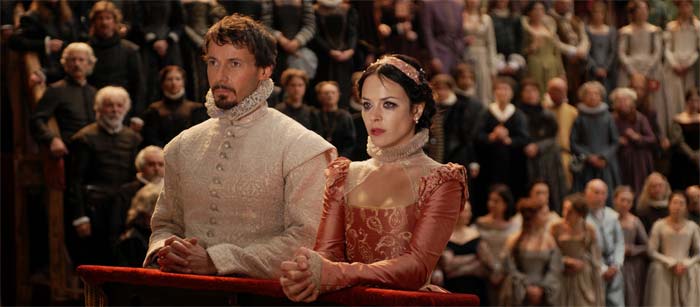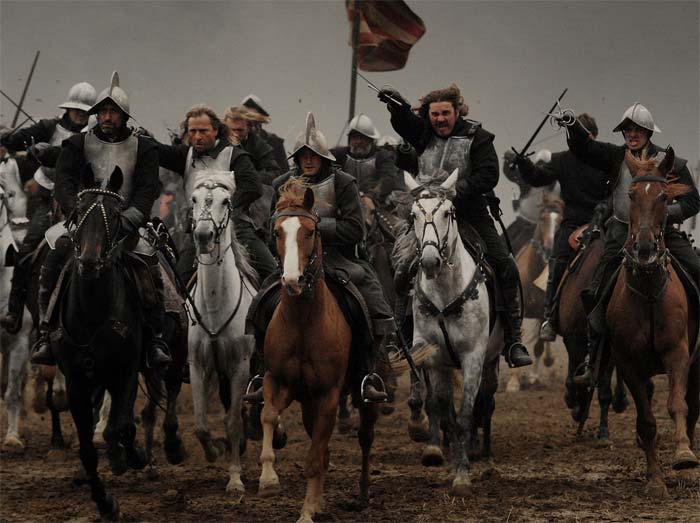
Director: Jo Baier
Cast: Julien Boisselier, Joachim Krol, Hannelore Hoger, Ulrich Noethen, Armelle Deutsch, Chloé Stefani, Gabriela Maria Schmeide, Roger Casamajor, Sven Pippig, Sandra Huller
Country: Germany
Year: 2009
Henry Of Navarre is a historical dramatization that attempts to document the period of Henry IV’s ascension to the throne and the religious wars which preceeded it. But despite the film’s loftiest intentions, a weak script and an even weaker crew burden it to the point of no recovery.
All of the characters in the film are just that — characters — and they fulfill their general beings with mind-blowing one-dimensionality. Take, for instance, Henry Of Navarre (Henry IV) himself. While generally loved throughout his reign, Henry is shown in the film as completely without fault — a point that is accentuated by the fact that he is surrounded by a slew of ridiculously worthless characters. Those characters include Catherine de Medici, mother of the three kings prior to Henry IV. She is known in history for her ruthlessnesss, but the only quality she possesses in the film is cruelty; she might as well have been Cruella de Vil, with less style. Her youngest son, Henry III, is probably the most complex character in the film, and even he is a caricature of a helpless homosexual king who keeps eccentric company. But it’s obvious that character development means little, since new characters spring up inconsequentially and main characters die off without warning. Their deaths are alluded to but never shown (not that viewers are saved from their breathily expelled “last words,” however).
Unintentionly, Henry Of Navarre feels like a complete spoof of period pieces. It begins with running and screaming peasants, who seem fresh from theatre school. Over time, the theatrical aspects fade a little, but the cliches remain. Henry Of Navarre attempts to appease everyone by incorporating all genres of cinema. Immense battle scenes with hectic camerawork show up time and time again. A voyeuristic jaunt through a hedonistic masquerade evokes a scene from Eyes Wide Shut. Sex scenes of numerous types satiate the viewer with a plethora of breasts. And montages of flashbacks add nothing to the storyline whatsoever.
The worst points of the film, though, are when the soundtrack becomes noticeable. Veteran composer Hans Zimmer and Henry Jackman, who has worked on films like Pirates Of The Caribbean and The Da Vinci Code, crafted it. But whereas the aforementioned films probably have a series of checks and balances to keep their soundtracks from becoming too predictable, Henry Of Navarre seems to have none of those, and some scenes are seriously laughable. Each time Henry IV’s latest lover appears from the woodwork — standing in the sunlight, of course — a lute and flute combination befitting the Renaissance period cues. As Henry IV and his comrades dash up the stairs to aid a fallen king, an action soundtrack you might find in Die Hard accompanies. Haunting music one might find in a horror movie seems to build up to a tense point, but there’s actually no gravity behind it at all; a few soldiers are casting shadows onto the metal bars of what could be a prison, but it’s not a prison at all, and the soldiers are complete nobodies.
The lack of a critical thought process behind segues and general mood shifts are, in the end, the absolute downfalls of Henry Of Navarre. While the filmmakers obviously approached the project with a genuine desire to craft a fantastic high-budget period piece, what they end up with is quite a failure.









[…] Saigon Electric may be the first film of its kind for Vietnamese youth, and its greatest value may lie in this fact. The cinematography is decent, the cast is cute, and the soundtrack, in isolation, is appealing enough — but all playing fields leveled and all socioeconomic and sociopolitical factors discounted, Saigon Electric is the worst film I’ve seen since last year’s Henry Of Navarre. […]